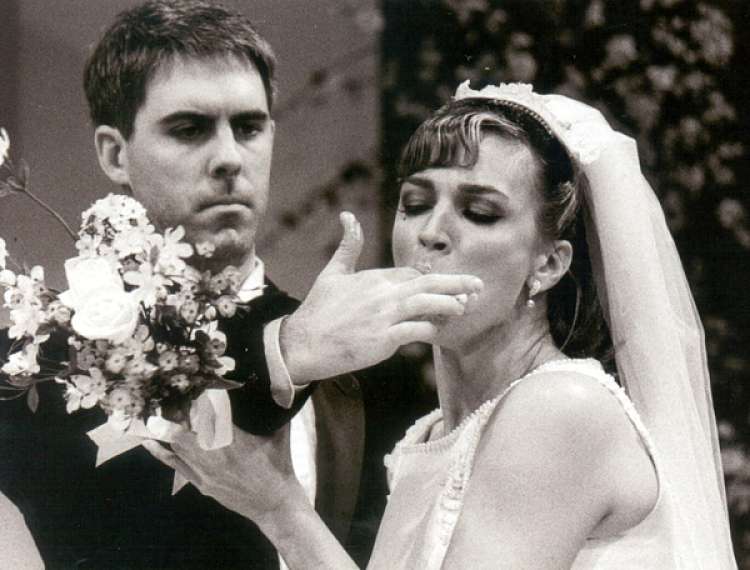Fourteen years ago, while the wreckage of the World Trade Center still smoldered and the response to what felt like the existential devastation of the 9/11 attacks was still as much sincere confusion as steely resolve, everything looked and felt different than before (for a while, at least): our relationships, our politics, our public spaces, nothing less than the meaning of our lives, collectively and individually. A hinge of history had wrenchingly turned under us, and it was profoundly disorienting.
This was no less true of our experience of art, including the theatre, which was my beat then as it is now. While New York Theatre Workshop went ahead with rehearsals and preparations for Tony Kushner’s Homebody/Kabul as U.S. bombs began to rain on its title city, in L.A., the wonderfully anomalous theatre town I was covering, Evidence Room soldiered on with its strange, polymorphously provocative Chuck Mee sketch show The Imperialists at the Club Cave Canem. Certainly my most vivid post-9/11 theatre experience was a fortuitously chilling rendition of “Pirate Jenny” in an already running and otherwise just-fine Brecht/Weill anthology show called Songplay at the Odyssey Theatre; Melody Butiu delivered its grimly gleeful tale of retributive mass violence without apology, and I knew I’d never hear that song the same way again.
I also remember that, as editor of the theatre reviews for Back Stage West, hardly a day went by that I didn’t read a notice that either said something like, “This lovely piece of fluff is exactly what we need to get our minds off of tragedy,” or something like, “This challenging, thought-provoking is exactly what we need to hear, now even more than ever!” As I wrote a few years back, “Clearly, what we needed then, as now, is theatre that does both: reflects and refracts as well deflects and diverts.”
It may be a measure of how much the stakes and the world have changed in the intervening years that in the week or so after the recent deadly attacks in Paris—at such public gathering places, it was hard not to notice, as a theatre, a sports stadium, a cafe, a shopping center—there was undoubtedly a certain extra something trembling in the air as I ventured out among dense crowds in New York to take in shows and grab bites at cafes, but it was harder to place than the blunt-force impact of 9/11.
Yes, it was a little eerie to hear characters in the Roundabout’s stark, somber production of Therese Raquin talk with bloodthirsty fascination about murderers at large in Paris; “revolution in Paris” also happens to be a recurring background motif of Berg’s deeply unsettling, oddly moving opera Lulu, now in a waking-dreamlike William Kentridge production at the Met. And in Isaac Butler, Darcy James Argue, and Peter Nigrini’s Real Enemies—another music-theatre piece which, like Lulu, employs both an idiosyncratic version of 12-tone composition and nonstop video projections—the specters of shadowy forces that some people believe (occasionally accurately) move behind the world’s events, from the moon landing to the crack epidemic to 9/11, were conjured in a coolly anguished seance; it was as if paranoia had been distilled into a palpable, fluid theatrical property, a kind of mercury. (Red mercury?)
At the Chicago Tribune, Chris Jones wrote a thoughtful piece about how the attacks both informed and warped his experience of watching fictional tragedy and violence onstage in the ensuing days. And I can’t help recalling Charles McNulty’s incisive reflection, written for the Los Angeles Times in early September, on what Aeschylus’s The Suppliant Maidens might have to say to the current Syrian refugee crisis. McNulty admitted that there is not a one-to-one correlation, let alone an open-and-shut moral case, in the comparison, but the complications may be to the point: The Danaids, Egyptian women who seek asylum in the Greek city of Argos, threaten the Argive ruler, Pelasgus, with the spectacle of a mass public suicide if their request isn’t granted. And while Pelasgus ultimately concedes, it’s not as if he has no compelling reason to deny their entreaties, since accepting them will likely lead to war with the women’s cousins.

That’s certainly what happens in Mee’s Big Love, which I saw definitively staged at L.A.’s Pacific Resident Theatre in 2002 (it was recently given a spirited if overzealous revival at New York’s Signature Theatre), and which vividly recasts, updates, and fleshes out the Aeschylus material (Suppliant Women is probably only one extant part of an otherwise lost trilogy of plays). As we contemplate our Western stance not only to the needs of refugees but to the threats that continue to confront us in the world, McNulty’s final point—that these ancient plays “remind us that how we respond” to crisis “determines something fundamental about our humanity”—seems more salient than ever.
Finally, I would be remiss here if I didn’t point to Joseph Ataman’s striking piece, in our July/August issue, about theatre being made in Beirut (where, it should be noted, there was a deadly attack in the days before Paris) with and for the city’s refugee and migrant worker populations, one in five or whom have fled Syria’s civil war. The organizations included Catharsis, Aperta, and Migrant Workers Task Force; the plays included Sophocles’s Antigone. Along similar lines, I took note of this recent story in the Guardian about England’s West Yorkshire Playhouse forming the nation’s first “sanctuary theatre”, where refugees are welcomed into the life of theatre, both onstage and otherwise. I haven’t yet heard of any similar efforts at any U.S. theatres; if you hear of any, please drop me a line in the comments or at rwkendt@tcg.org.


